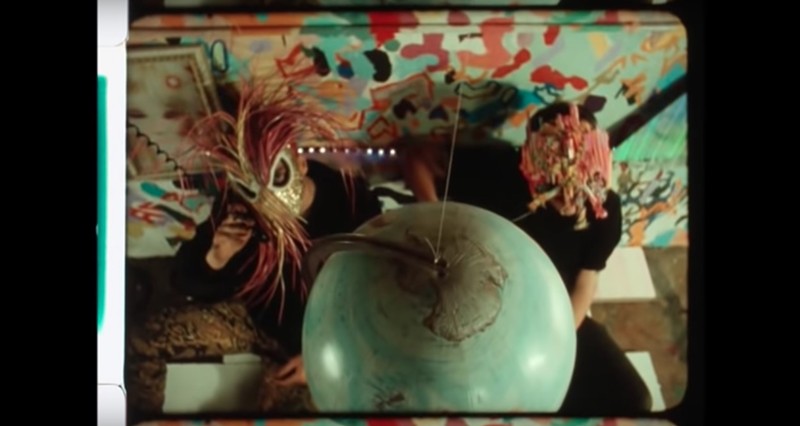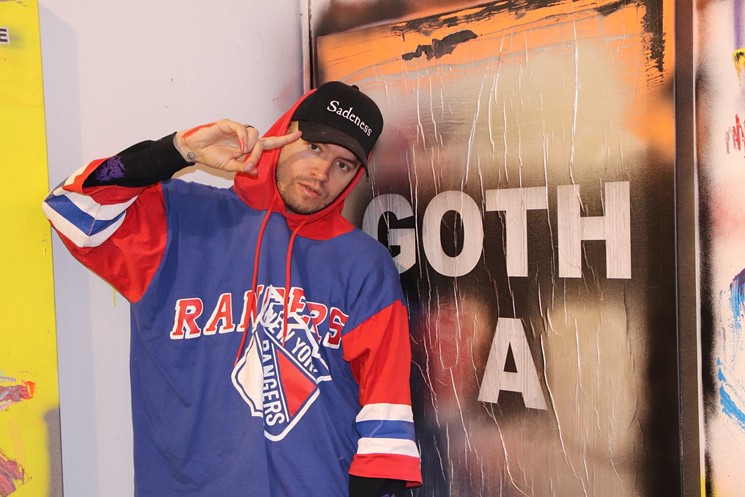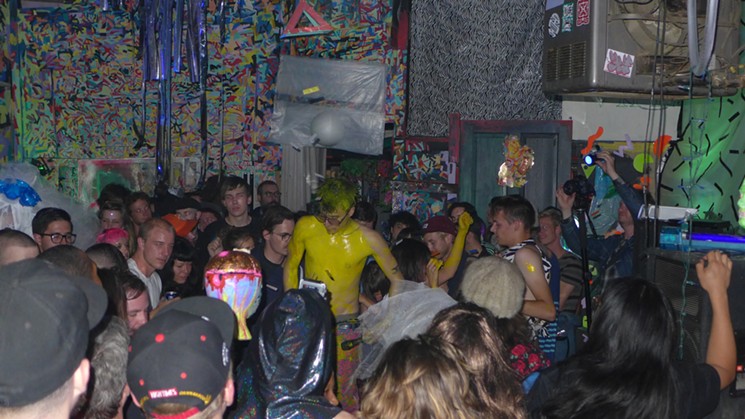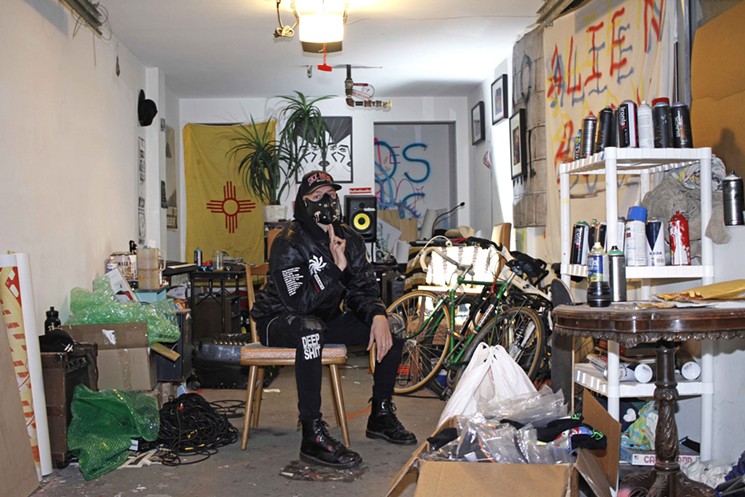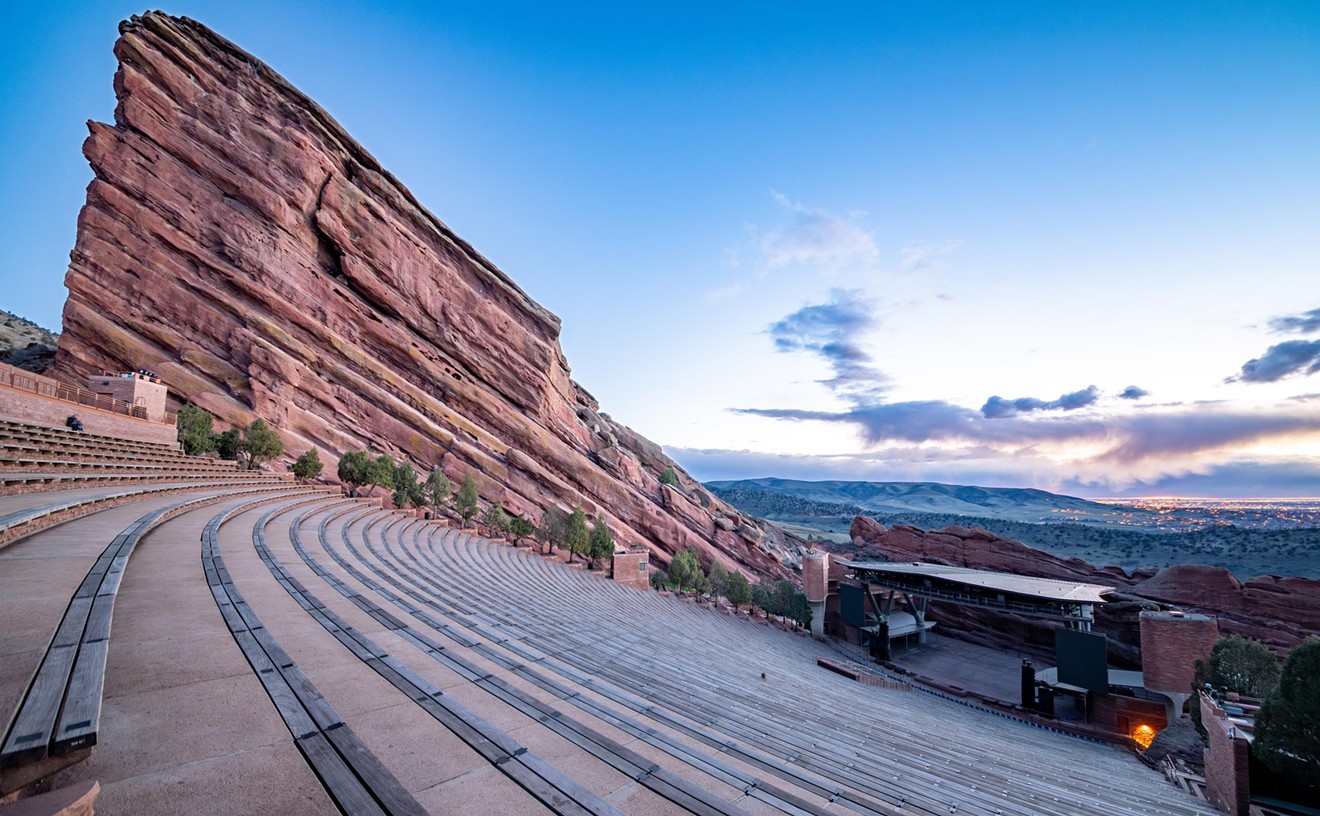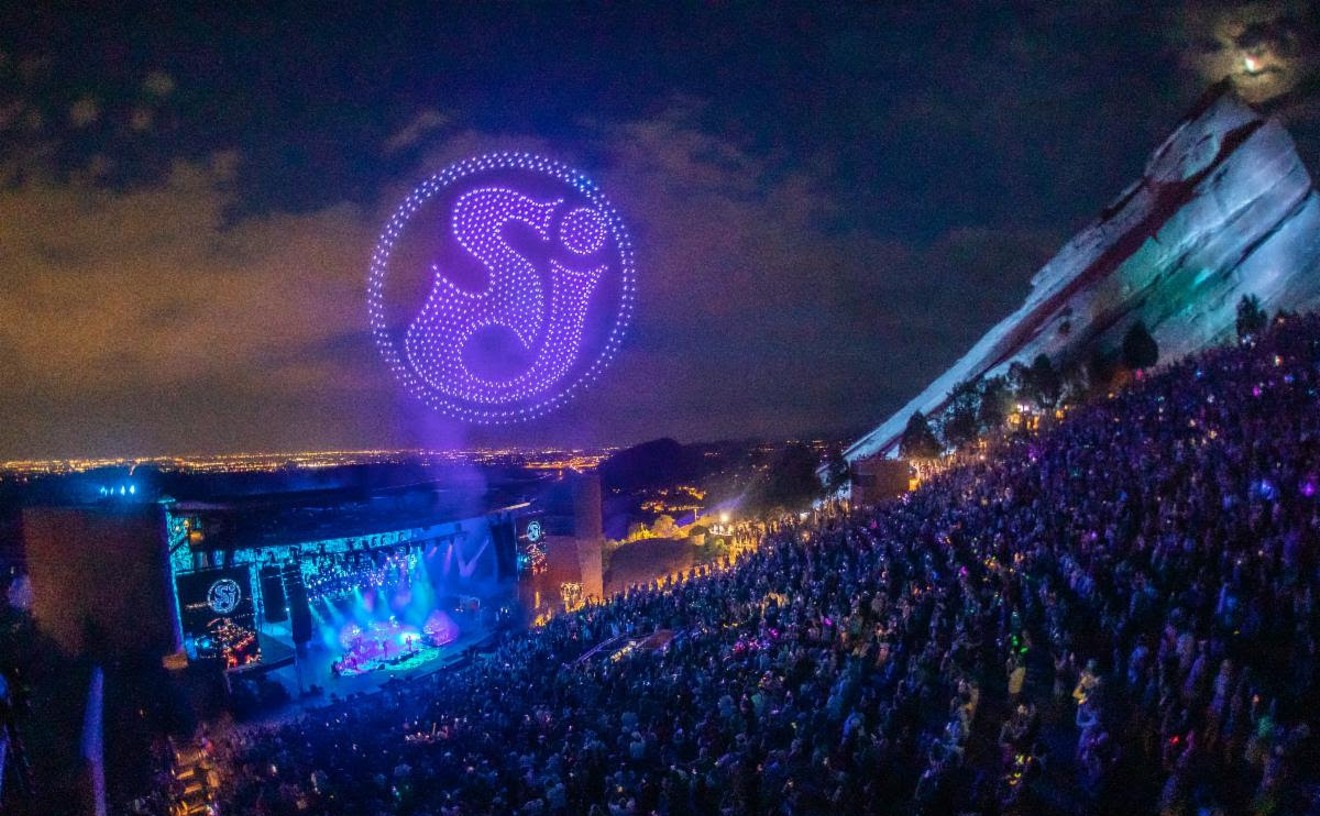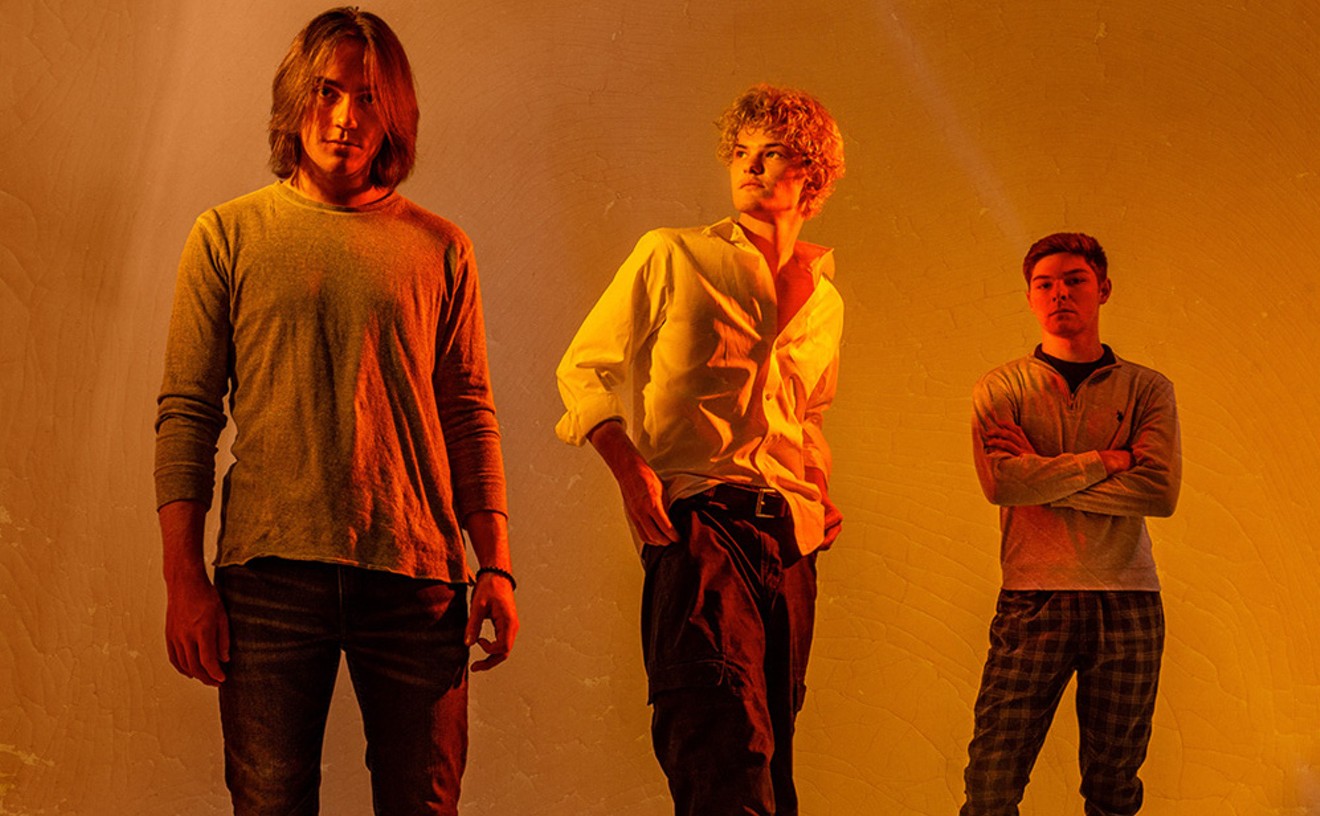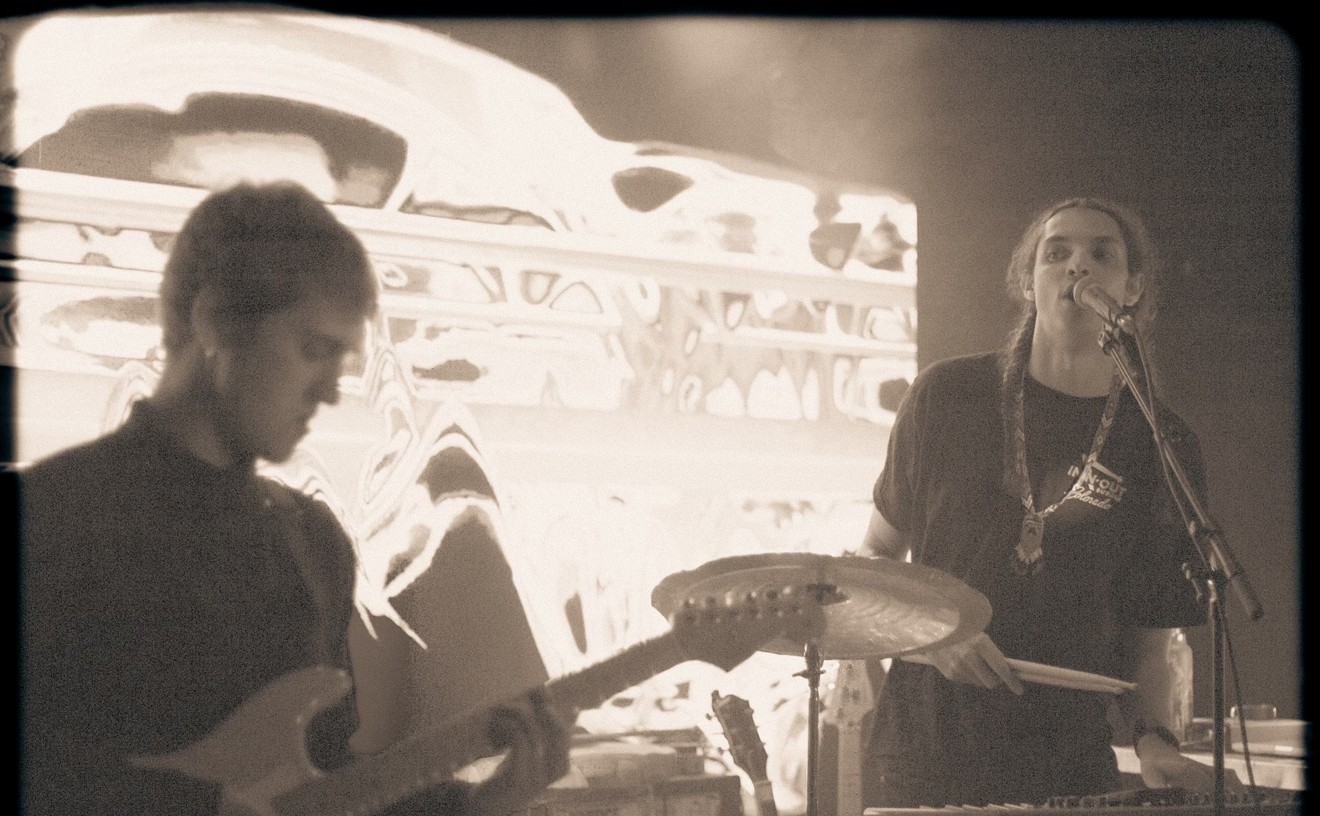Days after 36 people died in the Ghost Ship fire in Oakland in late 2016, Denver’s Rhinoceropolis and other DIY art spaces like it across the country were unceremoniously shut down by cities, tenants were made homeless, and the communities they served were left without space to commune.
Rhinoceropolis and its sister venue, Glob, were hidden-in-plain-sight life rafts for art weirdos. They went unnoticed by authorities for most of their decade-long lives on a once-desolate stretch of Brighton Boulevard that has since turned into a hotbed of economic activity and priced many former residents and working-class people out of Denver.
Artist Travis Egedy is one of dozens who lived in those spaces and helped breathe life into Rhinoceropolis, a two-room warehouse filled with cubbyholes and stages that gave total creative freedom and autonomy to musicians and artists.
Egedy’s latest music video, “Color Spectrum (Tokyo Drift),” serves as a time capsule of Rhinoceropolis and Denver’s DIY culture around 2012. It is the latest incarnation of Egedy in his long and versatile career under the moniker Pictureplane, and it is a tribute to Colin Ward, a fellow art weirdo who found a home at Rhinoceropolis and who died by suicide earlier this year.
“I'm really happy with how [the video] came out. That footage has never been seen before,” says Egedy over the phone from his home in Brooklyn, where he’s lived for the past half-decade after moving from Denver. These never-before-seen clips of 16mm film sew images of the interior of Rhinoceropolis circa 2012 together with current shots of Egedy and his collaborator, smrtdeath, a musician out of Winnipeg, Manitoba.
Both lyrically and visually, the song and music video are tributes to Ward, a friend and cohort of Egedy’s, whose spirit and artistic presence shaped Rhinoceropolis.
“Colin and I knew each other for a really long time. He and I met when he was fifteen and I was nineteen,” says Egedy. “Weirdly, I was dating this girl; she knew Colin somehow. I think they were in a band together. She introduced me to him when he was like this little kid. But that meeting was kind of fateful, actually, because I gave him my music, some of my, like, really, really early Pictureplane stuff, and he gave me some of his music. I know that the CD I gave him was really profound to him — he was super into it.”
Egedy says that he and Ward were friends from that point on. Ward started coming to shows at Rhinoceropolis as a teen, and it wasn’t long before he was playing shows there as well. Years later, Ward would become one of the many artists who inhabited the warehouse space as a tenant, contributing to its constant aesthetic and energetic changes, one era of which is caught on camera in the “Color Spectrum (Tokyo Drift)” video.
Shot by Daniel Daenen, the footage is grainy but eye-catching, images of Ward and Egedy fluttering by in various states of performance. Many other local creators make cameos, too, including visual artists and close musical collaborators like Thomas Scharfenberg, Kathryn Taylor and Stephan Herrera. The video captures the mutability of Rhinoceropolis. In some frames, it looks like 1970s no-wave-era New York; in other moments, it looks exactly like itself, a strange, grimy warehouse existing in mid-2000s Denver on an isolated stretch of road that felt like nowhere but also felt like home.
“I love the quality of that footage that makes it weirdly timeless,” says Egedy. “You can't really tell when it is or what's going on. It could really be any time — it could be the ’80s or in the future, like 2030. The quality of the film, of course, makes it look really old and nostalgic, but also, everyone's clothes and the way people look — everyone just looks so wild. The interior of that place has always been crazy-looking, so it's hard to put a year on it.”
“Color Spectrum (Tokyo Drift),” named for Ward, who online went by the moniker Tokyo Drift, was the last song to come together on Pictureplane’s latest album, Degenerate, released in September of this year on Egedy’s own label, Alien Body Music.
“It was sort of the final piece of the puzzle for my album,” says Egedy. “I knew I wanted another vocalist on there, so I hit up my friend smrtdeath. He sent me the verse, and this was right around the time of Colin’s passing. I hadn't even recorded my vocals yet on the song. I knew I wanted to use Colin's voice or something on my album, so I just decided to write the lyrics about him and dedicate the song to him. That was the final song I made on the album, and then it was finished.”
Over the past two years, as the dominoes of grief fell for Egedy and many others in the community — the massive tragedy of Ghost Ship, Rhinoceropolis’s closure, then Ward’s death — he found himself in the role of spokesperson and advocate for the DIY spaces that had been his home and welcomed him for years as a touring musician.
“It was also shocking to me that after Rhinoceropolis got shut down just how many people were coming out of the woodwork misunderstanding what those spaces are and what they represent and what their value is,” says Egedy.
Egedy found himself defending the very nature of the communal art spaces against online trolls who targeted the DIY community in the wake of the tragedy.
“It was really shocking to me, because I’m involved in [the DIY community] and have been for years, but there are so many people out there that still are afraid of it, because they don't get it," says Egedy. "Or they're resentful that they have never had community like that or something, I'm not really sure. I think it's a fear thing, and I think it makes people angry, because they don't get it. That was a big theme on this record, and especially in that song and in the video.”
[
{
"name": "Air - MediumRectangle - Inline Content - Mobile Display Size",
"component": "12017618",
"insertPoint": "2",
"requiredCountToDisplay": "2",
"watchElement": ".fdn-content-body",
"astAdList": [
{
"adType": "rectangle",
"displayTargets": "mobile"
}
]
},{
"name": "Editor Picks",
"component": "17242653",
"insertPoint": "4",
"requiredCountToDisplay": "1",
"watchElement": ".fdn-content-body",
"astAdList": [
{
"adType": "rectangle",
"displayTargets": "desktop|tablet"
},{
"adType": "rectangle",
"displayTargets": "desktop|tablet|mobile"
}
]
},{
"name": "Inline Links",
"component": "18838239",
"insertPoint": "8th",
"startingPoint": 8,
"requiredCountToDisplay": "7",
"maxInsertions": 25
},{
"name": "Air - MediumRectangle - Combo - Inline Content",
"component": "17261320",
"insertPoint": "8th",
"startingPoint": 8,
"requiredCountToDisplay": "7",
"maxInsertions": 25,
"watchElement": ".fdn-content-body",
"astAdList": [
{
"adType": "rectangle",
"displayTargets": "desktop|tablet"
},{
"adType": "rectangle",
"displayTargets": "desktop|tablet|mobile"
}
]
},{
"name": "Inline Links",
"component": "18838239",
"insertPoint": "8th",
"startingPoint": 12,
"requiredCountToDisplay": "11",
"maxInsertions": 25
},{
"name": "Air - Leaderboard Tower - Combo - Inline Content",
"component": "17261321",
"insertPoint": "8th",
"startingPoint": 12,
"requiredCountToDisplay": "11",
"maxInsertions": 25,
"watchElement": ".fdn-content-body",
"astAdList": [
{
"adType": "leaderboardInlineContent",
"displayTargets": "desktop|tablet"
},{
"adType": "tower",
"displayTargets": "mobile"
}
]
}
]

